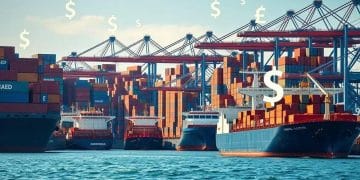Currency exchange trends: what you need to know

Anúncios
Currency exchange trends are influenced by factors such as economic indicators, political stability, and technological advancements, shaping investment strategies and market dynamics.
Currency exchange trends can dramatically affect how we interact with the world financially. Have you ever wondered how a small shift in rates impacts your travel plans or investments? Let’s dive into the intricacies of these trends.
Anúncios
Understanding currency exchange trends
Understanding currency exchange trends is essential for making informed financial decisions. As economies evolve, the rates at which currencies are exchanged fluctuate, impacting travel, trade, and investment opportunities.
Several elements shape these trends. Political stability, economic performance, and market perception all play significant roles. When a country exhibits strong economic indicators, its currency often appreciates against others. Economic events and government policies can lead to swift changes.
Anúncios
Key Factors Influencing Currency Values
It’s important to grasp the critical drivers behind exchange rates. Here are some primary factors:
- Interest Rates: Higher interest rates offer lenders a higher return relative to other countries, boosting currency strength.
- Economic Indicators: GDP growth, unemployment rates, and inflation provide insight into a nation’s economic health.
- Political Events: Elections and instability can create uncertainty, affecting currency value.
- Market Speculation: Traders’ perceptions often dictate currency value based on anticipated future movements.
Understanding how to analyze these elements can help you stay ahead. For instance, technical analysis employs historical data and charts to predict future movements. Conversely, fundamental analysis assesses economic conditions to determine currency strength.
Both techniques offer valuable insights into current and future currency exchange trends. By focusing on these strategies, you can make well-informed decisions, minimizing risks associated with currency fluctuations.
Factors influencing currency values
Several key factors play a crucial role in determining currency values. Understanding these factors can help you make better financial decisions regarding currency exchange and investments. Among these, economic indicators, political stability, and market sentiment are particularly significant.
Economic indicators provide insights into a country’s overall health. When a nation’s economy is strong, its currency tends to appreciate. Indicators such as GDP growth, inflation rates, and employment levels all contribute to this strength.
Key Economic Factors
Here are some essential economic indicators that impact currency values:
- Gross Domestic Product (GDP): A growing GDP indicates a robust economy, fostering confidence in that currency.
- Inflation Rates: Low inflation typically leads to a stronger currency, while high inflation erodes purchasing power.
- Interest Rates: Higher interest rates attract foreign capital, increasing demand for the currency.
- Employment Data: High employment levels often correlate with a strong economy, influencing currency strength.
Another major factor is political stability. Countries with stable governments draw more foreign investment, enhancing their currency’s value. Conversely, political unrest can lead to rapid depreciation as investors withdraw their funds.
Market sentiment also plays a significant role in establishing currency values. Traders and investors make decisions based on how they perceive current events and future expectations. If they believe a currency will strengthen, they often buy it, which can lead to actual gains.
In summary, the interplay between economic signals, political factors, and market perceptions shapes the fluctuations in currency values. Recognizing these influences can equip you to navigate the complex world of currency exchange more effectively.
How to analyze currency exchange rates

Knowing how to analyze currency exchange rates is vital for anyone involved in international finance, trading, or travel. Accurate analysis allows you to make informed decisions based on current market conditions and trends.
One important method of analysis is through technical analysis. This involves evaluating historical price data and patterns to predict future movements. By studying charts, traders can identify trends and potential turning points.
Tools for Technical Analysis
Several tools can assist in conducting technical analysis:
- Price Charts: These provide visual representations of currency movements over specific periods.
- Indicators: Tools like moving averages and Relative Strength Index (RSI) help gauge momentum and track trends.
- Support and Resistance Levels: Knowing where prices tend to bounce back or break through can significantly aid your trading strategies.
In addition to technical analysis, fundamental analysis plays a crucial role. This approach examines economic, social, and political factors that could impact currency values. By reviewing economic reports, trader sentiment, and geopolitical events, you can gain deeper insights.
Another vital aspect is monitoring news and updates. Major announcements, such as interest rate changes or economic forecasts, can drive immediate currency fluctuations. Staying informed through financial news sources can help you anticipate market reactions.
Combining both technical and fundamental analysis offers a comprehensive understanding of currency exchange rates. This dual approach equips you with valuable tools to navigate the complex world of currency trading.
Practical tips for investors
Knowing practical tips for investors can greatly improve your success in the currency exchange market. Implementing effective strategies can help you make informed decisions and optimize your investments.
First, it is essential to set clear goals. Determine what you aim to achieve through investing in currency exchange. Are you looking to diversify your portfolio, gain short-term profits, or hedge against inflation? Having clear objectives will guide your investment choices.
Research Before Investing
Do thorough research before making any investment decisions. Understanding the market, economic trends, and geopolitical events can significantly influence currency values. Pay close attention to news releases and financial reports that impact the currencies you are interested in.
Another key point is to utilize a trading plan. A structured plan helps you stick to your strategy, even in volatile markets. Your plan should outline your investment strategies, risk tolerance, and exit points.
- Diversify your investments: Avoid putting all your money into one currency. Spread your investments across different currencies to reduce risk.
- Stay disciplined: Emotions can cloud your judgment. Stick to your trading plan and make decisions based on analysis rather than fear or greed.
- Use stop-loss orders: These can help limit your losses by automatically selling a currency when it reaches a predetermined price.
Regularly review your investments to ensure they align with your goals. The currency market is constantly changing, so adjustments may be necessary. Keeping track of your performance helps you learn and adapt to new trends.
In summary, being a successful investor in currency markets requires diligence and preparation. By following these practical tips, you can position yourself to navigate the complexities of currency exchange more effectively.
The future of currency exchange markets
The future of currency exchange markets is shaped by various trends and technological advancements that are transforming how traders and investors engage with currencies. Understanding these changes can help you adapt and thrive in this dynamic environment.
One significant trend is the rise of digital currencies. Cryptocurrencies, like Bitcoin and Ethereum, have gained popularity and are now considered vital players in the financial landscape. These digital assets introduce new trading opportunities and challenges for traditional currency markets.
Impact of Technology
Technology is playing an ever-increasing role in currency exchange. Automated trading systems and algorithmic trading allow investors to execute trades quickly and efficiently. These systems analyze vast amounts of data to identify profitable opportunities, leading to faster market reactions.
Furthermore, mobile trading applications have made it easier for individuals to participate in currency exchange from anywhere. This accessibility is attracting a more diverse group of traders, leading to increased market activity.
- Increased Access: More people around the world can trade currencies due to online platforms.
- Real-Time Data: Traders can access real-time information, enabling informed decisions.
- Market Volatility: Advancements in technology can lead to faster price changes, increasing volatility.
Regulatory changes will also significantly affect the future of currency exchange. As governments catch up with technological advancements, stricter regulations may be imposed on trading practices, especially in the realm of cryptocurrencies.
Sustainability and ethical trading methods are expected to gain importance as investors become more conscious of social and environmental impacts. This shift may influence trading strategies and choices in the coming years.
Overall, the future of currency exchange markets is poised for transformation, influenced by technology, regulatory changes, and evolving trader expectations. Keeping an eye on these trends will help you navigate the future landscape of currency trading more effectively.
FAQ – Frequently Asked Questions about Currency Exchange Markets
What factors influence currency exchange rates?
Currency exchange rates are influenced by various factors, including economic indicators, political stability, and market sentiment.
How can I analyze currency exchange rates effectively?
You can analyze currency exchange rates by using technical analysis tools, such as charts and indicators, along with fundamental analysis to assess economic conditions.
What are some practical tips for currency investors?
Set clear goals, diversify your investments, stay disciplined, use stop-loss orders, and regularly review your investments to achieve success.
What is the future outlook for currency exchange markets?
The future of currency exchange markets is expected to be shaped by digital currencies, advancements in technology, and changing regulations that impact trading practices.






